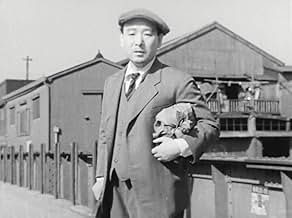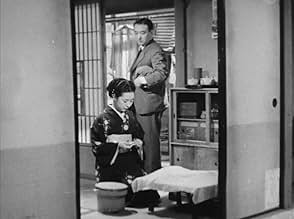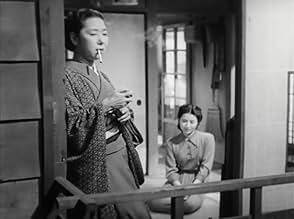Füge eine Handlung in deiner Sprache hinzuA few days in the life of a quiet geisha, single mother of a young, smart boy, in the lively Tokyo quarter of Ginza. A woman devoted to other people's needs, she will end by taking part hers... Alles lesenA few days in the life of a quiet geisha, single mother of a young, smart boy, in the lively Tokyo quarter of Ginza. A woman devoted to other people's needs, she will end by taking part herself in one of the many disguises of Ginza.A few days in the life of a quiet geisha, single mother of a young, smart boy, in the lively Tokyo quarter of Ginza. A woman devoted to other people's needs, she will end by taking part herself in one of the many disguises of Ginza.
- Regie
- Drehbuch
- Hauptbesetzung
Yoko Haruyama
- Yumiko
- (as Yôko Haruyama)
Empfohlene Bewertungen
This is a gentle, affectionate take on a middle aged bar hostess, struggling to bring up a child alone and facing financial, sexual and end of career issues, as well as the implied disapproval of society. There is plenty of humour, though, and acute observation of people and relationships in their everyday lives.
Apparently slow initially, one gets gradually drawn in to care for these essentially good characters, even the weak and slightly unreliable ones (generally men).
The set pieces of bar life are particularly well observed. And the mutual respect and simple good manners of Japanese society as depicted is always fascinating to Western eyes.
As ever with Naruse, the camera-work is so effective one is hardly conscious of it as one engages with this picture of a determined but dignified struggle by a virtuous woman.
Apparently slow initially, one gets gradually drawn in to care for these essentially good characters, even the weak and slightly unreliable ones (generally men).
The set pieces of bar life are particularly well observed. And the mutual respect and simple good manners of Japanese society as depicted is always fascinating to Western eyes.
As ever with Naruse, the camera-work is so effective one is hardly conscious of it as one engages with this picture of a determined but dignified struggle by a virtuous woman.
This was a good movie with good acting, more in line with European films than American, as the typical beginning/middle/end isn't there, you get more scenes from a life POV. There also aren't any overly emotional situations, just more of what you'd see in everyday existence, which doesn't mean dull.
In this case, you get absorbed by the story of a woman in the Ginza area of Tokyo, who works as a geisha to support herself and her young son (a pretty good child actor) and hasn't had the best of luck with men. Her son's father walked out on her when she got pregnant, and she's now the mistress of a married man, who once helped her out but now just takes advantage of her good nature. Things take a turn for the worse when the owner of the geisha bar talks of selling, and she has to deal with a rich but sleazy businessman, then take an upswing when she meets a charming, cultured man who may be the way to a better (as well as happy) life. She didn't know she'd have unexpected competition!
There were some good location scenes of the city back in the 1950's, as well as some musical entertainment (the little girl in the early scenes had quit a voice), and you bet bits and pieces of the lives of the other people who are part of the bar and the neighborhood. (The title, BTW, is all about the facades people put on day to day to play the roles they have to in order to get through their days.)
If you don't mind not getting the kind of ending typical of Hollywood, (and subtitles don't bother you) then you'll enjoy this film.
In this case, you get absorbed by the story of a woman in the Ginza area of Tokyo, who works as a geisha to support herself and her young son (a pretty good child actor) and hasn't had the best of luck with men. Her son's father walked out on her when she got pregnant, and she's now the mistress of a married man, who once helped her out but now just takes advantage of her good nature. Things take a turn for the worse when the owner of the geisha bar talks of selling, and she has to deal with a rich but sleazy businessman, then take an upswing when she meets a charming, cultured man who may be the way to a better (as well as happy) life. She didn't know she'd have unexpected competition!
There were some good location scenes of the city back in the 1950's, as well as some musical entertainment (the little girl in the early scenes had quit a voice), and you bet bits and pieces of the lives of the other people who are part of the bar and the neighborhood. (The title, BTW, is all about the facades people put on day to day to play the roles they have to in order to get through their days.)
If you don't mind not getting the kind of ending typical of Hollywood, (and subtitles don't bother you) then you'll enjoy this film.
The opening shots of this movie firmly puts it in the Ginza district of Tokyo back in 1951, with its distinct landmark of the Clock Tower, and serves kind of like a documentary snapshot of the district with following the kid Haruo in and around the area, before finally we get to meet his mom Yukiko (Kinuyo Tanaka), a bar hostess struggling to make ends meet.
Directed by Mikio Naruse, this movie doesn't have any big moments, and feels like a capture of the relatively mundane life of Yukiko, in her luckless meeting with various men who seem always to disappoint, and her taking care of her only son. These are acute observations that represent that slice of life, and doesn't over-dramatize or wallow in melodrama and the theatrics, which is quite commendable, given the usual tendency for movies of the genre to lapse into. Things happen as a matter of fact, right up until the tense and anxious moments of looking for a runaway kid.
Kinuyo Tanaka brings forth a quiet, stoic demeanour in her Yukiko, being unable to change her fate of being a single mother, and she could make you wring your heart as we experience together with Yukiko a potential moment of probably romance with a young man flit away, despite initial reluctance to get acquainted and help out in his stay in Tokyo. I thought it was quite magnanimous of her to do what she did, and felt that it was really sad for one to resign to her fate without any inclination to challenge it with the hope that things might be for the better.
If you prefer your movies quiet, with the dignified presence of a star actress at her element, then perhaps Ginza Cosmetics would be a launchpad for anyone interested in following the filmography of director Mikio Naruse, and of his many film collaborations with Kinuyo Tanaka.
Directed by Mikio Naruse, this movie doesn't have any big moments, and feels like a capture of the relatively mundane life of Yukiko, in her luckless meeting with various men who seem always to disappoint, and her taking care of her only son. These are acute observations that represent that slice of life, and doesn't over-dramatize or wallow in melodrama and the theatrics, which is quite commendable, given the usual tendency for movies of the genre to lapse into. Things happen as a matter of fact, right up until the tense and anxious moments of looking for a runaway kid.
Kinuyo Tanaka brings forth a quiet, stoic demeanour in her Yukiko, being unable to change her fate of being a single mother, and she could make you wring your heart as we experience together with Yukiko a potential moment of probably romance with a young man flit away, despite initial reluctance to get acquainted and help out in his stay in Tokyo. I thought it was quite magnanimous of her to do what she did, and felt that it was really sad for one to resign to her fate without any inclination to challenge it with the hope that things might be for the better.
If you prefer your movies quiet, with the dignified presence of a star actress at her element, then perhaps Ginza Cosmetics would be a launchpad for anyone interested in following the filmography of director Mikio Naruse, and of his many film collaborations with Kinuyo Tanaka.
Even as a 70-year-old man myself, I found myself drawn to this film of a protagonist who is female. The reason is because it somewhat reminds me of my own Mother who passed away a few years ago at the age of 97. And somewhat similar to the boy in this film, my own Father passed away when I was 6 years old. So I had to be raised by a single Mother the same as Yukiko in this film. But the big difference is that my Mother was a Registered Nurse.
In comparison, Yukiko is a bar hostess yet still retains her virtuousness. The most striking resemblance I see between Yukiko and my own Mother is her admirable self-restraint, that is, not getting angry in situations that would cause others to lose their temper. Even when I did things wrong, my Mother never yelled at me, and yet I still learned the difference between right and wrong. So that character trait of self-restraint is what I learned and adopted to this day.
Yukiko taking responsibility and never blaming anyone else is a trait we see in the Japanese race as a whole. That's why Japan has the lowest murder rate. Compare that with the high murder rate here in the United States. Notice that the Mass-type shootings here in the states are the result of people who blame others for their misfortune. So we can learn from Yukiko whose character trait of forbearance is actually a reflection of the Japanese ethnicity as a whole.
In comparison, Yukiko is a bar hostess yet still retains her virtuousness. The most striking resemblance I see between Yukiko and my own Mother is her admirable self-restraint, that is, not getting angry in situations that would cause others to lose their temper. Even when I did things wrong, my Mother never yelled at me, and yet I still learned the difference between right and wrong. So that character trait of self-restraint is what I learned and adopted to this day.
Yukiko taking responsibility and never blaming anyone else is a trait we see in the Japanese race as a whole. That's why Japan has the lowest murder rate. Compare that with the high murder rate here in the United States. Notice that the Mass-type shootings here in the states are the result of people who blame others for their misfortune. So we can learn from Yukiko whose character trait of forbearance is actually a reflection of the Japanese ethnicity as a whole.
Wusstest du schon
- Alternative VersionenThere is an Italian edition of this film on DVD, distributed by DNA srl, "SOGNI DI UNA NOTTE (Yogoto no yume, 1933) + OMETTO, FAI DEL TUO MEGLIO! (Koshiben ganbare, 1931) + LE APPARENZE DI GINZA (Ginza Cosmetics, 1951)" (3 Films on a single DVD), re-edited with the contribution of film historian Riccardo Cusin. This version is also available for streaming on some platforms.
Top-Auswahl
Melde dich zum Bewerten an und greife auf die Watchlist für personalisierte Empfehlungen zu.
Details
- Laufzeit1 Stunde 27 Minuten
- Farbe
- Sound-Mix
- Seitenverhältnis
- 1.37 : 1
Zu dieser Seite beitragen
Bearbeitung vorschlagen oder fehlenden Inhalt hinzufügen





























